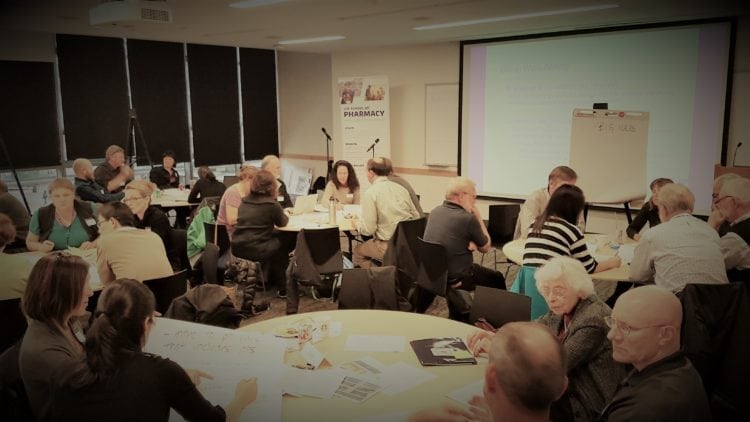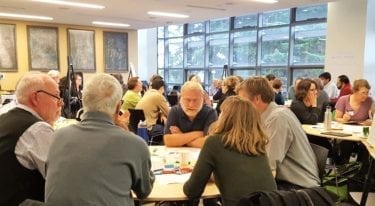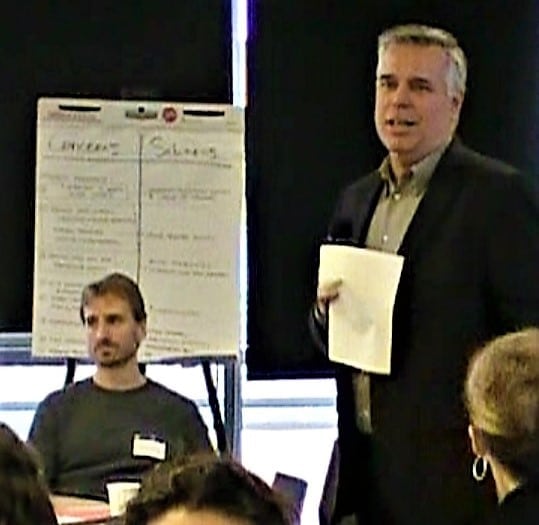
The Curricular Innovation Faculty Retreat on November 1st was a success thanks to the majority of UWSOP faculty being in attendance. Faculty heard an overview of the work done by the Curricular Innovation Guidance Team since forming, considered our recommendations for moving forward, and provided their feedback and ideas on our work and next steps.
Dr. Peggy Odegard, Curricular Innovation Guidance Team chair, kicked off the retreat with quick introductions of guidance team members and the guest practitioners participating in the retreat, which included Drs. Jenny Arnold from the Washington State Pharmacy Association, Brad Hanna from Costco retail, Elyse Tung from Kelley Ross Community Independent, Steve Anderson from Costco e-commerce and the Washington State Pharmacy Quality Assurance Commission, and Nancy Lee from Swedish Primary Care. Dr. Odegard presented an overview of the anticipated curricular innovation timeline and where we are in the process, emphasizing that a new curriculum would be implemented no sooner than September 2018.
Dr. Jennifer Danielson, Guidance Team member from the UWSOP Department of Pharmacy, and Director of Interprofessional Education and an Experiential Education Program Director, provided a short overview of all of the input and evidence gathered by the guidance team to date, why change is needed now, and presented examples of other innovative curricular designs from pharmacy schools across the nation and from our neighbor UW Schools of Medicine and Dentistry.
 After hearing the summary of the drivers for beginning our curricular innovation, faculty split into small groups to provide their feedback on potential barriers or challenges to the success of the curricular implementation or new curriculum, with facilitation assistance provided by Dr. Steve Pickette, guidance team member and Assistant Director of Clinical Services at UW Medicine Harborview, and Christene James, UWSOP Assistant Dean of Finance and Administration. This “TRIZ” exercise is a focus group activity designed to identify and document concerns, and to make room for unimpeded innovative ideas to develop. TRIZ (also knowns as TIPS) is a research-supported “theory of inventive problem solving” first developed in 1946 by Genrich Altshuller, a Soviet inventor and science-fiction author (Sheng and Kok-Soo, 2016).
After hearing the summary of the drivers for beginning our curricular innovation, faculty split into small groups to provide their feedback on potential barriers or challenges to the success of the curricular implementation or new curriculum, with facilitation assistance provided by Dr. Steve Pickette, guidance team member and Assistant Director of Clinical Services at UW Medicine Harborview, and Christene James, UWSOP Assistant Dean of Finance and Administration. This “TRIZ” exercise is a focus group activity designed to identify and document concerns, and to make room for unimpeded innovative ideas to develop. TRIZ (also knowns as TIPS) is a research-supported “theory of inventive problem solving” first developed in 1946 by Genrich Altshuller, a Soviet inventor and science-fiction author (Sheng and Kok-Soo, 2016).
During the exercise, faculty identified a lack of resources (e.g. funding, faculty time, classrooms, transition support, and technology), and resistance (to the process or new curriculum), as being the two most important potential impediments to success. Other areas needing attention and support for success were outcome goals to guide changes, consideration of not losing key information and effective learning provided in the current curriculum, experiential sites and preceptors, and student readiness.
 Dr. Sean Sullivan, UWSOP Dean, then spoke for several minutes, addressing the raised concerns and explaining the efforts already underway in addressing issues such as the additional resources that will be needed during the planning and implementation of a new curriculum.
Dr. Sean Sullivan, UWSOP Dean, then spoke for several minutes, addressing the raised concerns and explaining the efforts already underway in addressing issues such as the additional resources that will be needed during the planning and implementation of a new curriculum.
After a short break, guidance team members Dr. Abhi Nath from UWSOP Department of Medicinal Chemistry, and Dr. Doug Black from UWSOP Department of Pharmacy, presented the guidance team’s draft recommendations and rationale for graduate outcomes for the “Husky Pharmacist of 2025,” as well as the core principles guiding the development of our new curriculum. After a short discussion to identify any incorrect or missing concepts, faculty were then asked to break into different small groups, brainstorm curricular change ideas, and prioritize up to three ideas that would achieve the Husky Pharmacist of 2025 while adhering to the core curricular principles.
Faculty generated 23 creative “big ideas” that addressed the curricular structure, content, and/or process, and which covered a wide range of areas, including:
- Active learning, case studies, and longitudinal projects
- Admission requirements
- Curricular pathways, timing, organization, and collaboration
- Early experiential and interprofessional approaches
- Faculty training
- Mentored primary literature evaluation
- Practitioner partnerships
- Student peer assessment
- Technology integration
The UWSOP Curricular Innovation Guidance Team met shortly after the retreat to begin synthesizing the input and ideas gathered from the faculty. In January 2017, the curricular model will be finalized with additional faculty input during another retreat. Design workgroups will then be identified to begin developing pieces of the new curriculum. At an all-school faculty meeting in February, faculty will vote on the finalized curricular model.
A video of the retreat and the presentation slides are available for internal review by UWSOP faculty and staff. As always, the UWSOP Curricular Innovation Guidance Team welcomes additional thoughts and ideas through the “Get Involved” page.
Citations:
Sheng, I. L. S. and T. Kok-Soo, (2010). “Eco-Efficient Product Design Using Theory of Inventive Problem Solving (TRIZ) Principles.” American Journal of Applied Sciences 7 (6): 852-858. Retrieved 23 November 2016. DOI: 10.3844/ajassp.2010.852.858